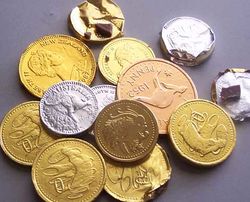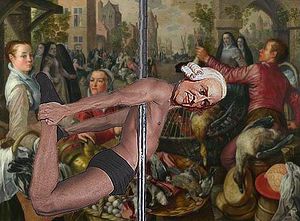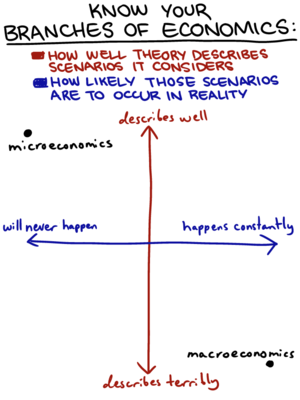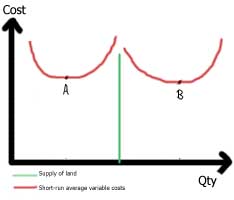Economics

“Fuck this shift.”
– Every analyst on Economics
“The hand is invisible for a reason.”
Economics is the subtle art of calculating how much money you can make by ripping off your friends, ripping off your customers, ripping off your consumers, ripping off your people, and when everything else fails, ripping off your clothes.
History[edit | edit source]
| Economics |
|---|
 |
| Ideologies |
| Theories |
It began in the 17th century with an adolescent of the name Adam Smith who had certain issues as he grew up. His mother, fed up with feeding him with her crack money, kicked him out to the street. For a year he wandered the streets of London, picking up dropped pennies and selling pre-owned toiletries. It is through the hardships of life that he learnt the subtle art of making money.
In his youth, Adam Smith made a name for himself by ripping money off people. Occasionally he would take of his clothes and dance around a pole like a stripper, except with more body hair. As people were both distracted and disturbed by the sight of young lad devoid of clothes with his plumage billowing, Smith stole money from them. This greatly impressed Her Majesty the Queen of Britain. Smith was soon appointed as a courtier who taught them how to rip money off people. Thus took birth the noble subject of Political Economy.
Economics s a study of curves[edit | edit source]
People read up Wealth of Nations, Adam Smith's legendary book on political economics, and figured that economics was all about getting the best hooker by paying the least. This notion went around for quite a while before someone decided that he would calculate how much money he could effectively deny the hooker without having to spend the night alone masturbating to Renaissance nudes instead. One thing led to another, and in the meantime, one bored motherfucker, Sir Isaac "Motherfucker" Newton invented calculus. This knowledge, combined with that of totem poles, made economists quite competent in the field of money making. They could now make 4x money just by integrating a box of matches and a cat (8x if it was Super Effective). They termed this the multiplier. Economics, formerly defined as 'study of man', was referred to as 'study of curves'. This gave a sudden rise in Economics honours students at universities, mostly male. These budding economists only studied curves, and were later responsible for the Great Depression.
Demand and supply[edit | edit source]
“I'll give you a higher wage, now bend backwards.”
– Adam Smith on the labour supply curve
The crux of economics is built upon the basic laws of demand and supply. One one hand if you want something and you do have the money for it, you'll go for it. Unless you're Greek, in which case you are broke by default. If there is a sufficient demand, producers will be keen to supply more of their crap.
The origin of the Law of Demand lies in the times of the Crusades, where the Arab lords would charge high prices for water. When Richard the Lionheart went on a sojourn in the Arabian desert, he paid a whopping ₤12m for a bottle of water. That did nothing to quench his thirst, so he had to purchase another bottle. By the time he reached the third bottle he had enough energy but no money. The Arab lord wanted another ₤12m for the fourth bottle. In a flash Richard realised, the less he wanted the water, the less he was willing to pay. Now totally pissed off at the loss of ₤36m, he pulled his sword and beheaded the water-bearer, thus triggering the Third Crusade. Richard returned to England with the noble concept of Demand, which Adam Smith later formulated into a law.
The Law of Supply, however, was conceived about three centuries when England started dumping their industrial goods on her colonies, particularly India. All the good mathematicians of India had gone off to the US for better employment opportunities, and the ones who were left were too busy asking for people's credit card numbers to understand business. They fell for the 'more the merrier' bait and purchased tons of angrezi clothes. The British merchants realised, greater the price, more they wanted to dump their goods, and thus was born the Law of Supply.
In a perfectly competitive market of the modern world, prices and quantities are determined by the interaction of demand and supply. Adam Smith called this the invisible hand. According to him, if you're doing something unfair, like charging a higher price (or conversely, paying less), you need to have something to account for it. Just like God.
Microeconomics and macroeconomics[edit | edit source]
The foundations of microeconomics were laid by John Maynard Keynes who only wanted to calculate the size of his penis. Every student of microeconomics has to go through the diagrams of his upward rising and downward sloping curves.
Microeconomics[edit | edit source]
The earliest microeconomists were people deliberating how much honey they were willing to barter for a bunch of bananas. Little has changed since then. Microeconomics today is a broad branch of economics that deals with things like how much you just have to pay the hooker. Unless you want to spend the night alone masturbating to Renaissance nudes. Or worse. Microeconomics has links to studies of cost and production, and dieting tips. Researchers of this field are known to have spent significant amounts of time studying indifference curves. Academics speak highly of the relations between microeconomics and Microsoft. It is also linked to spirituality and karma. To quote 50's microeconomist John Lennon, "It is important to appreciate the little things in life."
Macroeconomics[edit | edit source]
Macroeconomics, in contrast, deals with things that are big. Really big. You cannot imagine how mind-bogglingly big these are. Stuff like national income and total marijuana exports fall under this massive category. Even larger still are things that are actually negatives, such as budget deficits and debt.
If you lead a rich country, macroeconomics can tell you how to maximise industrial production, acquire more revenue, acquire a Ferrari, acquire another Ferrari, acquire a squadron of F18's, acquire TANKS!!!, acquire a titanic Titanic, and exploit degrading third world economies.
If you lead a third world economy yourself, macroeconomics will tell you how to improve your national income, international trade, standard of living, PPP$, HDI, Sen's index and scores of other stuff...and then remind you that you don't have money to build new schools. Hahahaha. Loser.
Contributions to society[edit | edit source]
Economics has, in the history of time, greatly influenced society. From undocumented barter in the Bronze Age to modern day digital transactions, principles of economics have helped mankind trade fairly. Apart from that, it has also helped us in the following ways:
- Revolutionised pole dancing.
- Made people rational.
- Invented the holy and sacred budget deficit.
- Encouraged sex.
- ...with rubber.
- Started the Great Depression.
- Ended the Great Depression.
- Created Ringo Starr
- Main brain behind the Gulf War. AND the Kargil War.
- Chilled out with Lehmann bros.
- Legalised marijuana.
- Moved Uncyclopedia from wikia.
Economics pickup lines[edit | edit source]
- You make my demand curve rise upwards.
- Don't you worry, I'm macro where it matters.
- I'll derive utility from your curves.
- I wish to put my inelastic demand curve between your SRAC's.
- I practice revealed preference - I prefer that you reveal it all.
- My protection policy is quite elastic.
- I'll maximise your satisfaction with my endowment.
Why Date An Economist[edit | edit source]
Don't. Unless he's rich. Really, really rich.
Why Date A Female Economist[edit | edit source]
Don't. Unless she's macro.






